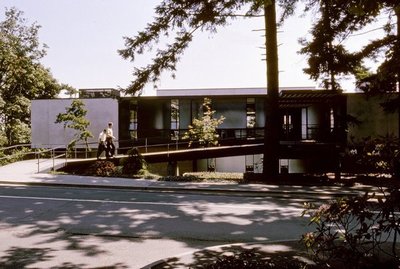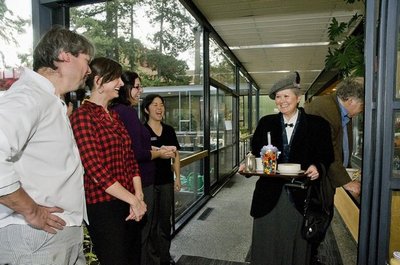October 7, 2010
The UW Club, past, present and future: ‘It’s about relationships’
Talking over coffee with the current and former managers of the University of Washington Club, hearing stories and stealing glances at the splendid view, you really get a feel for the club’s past and the personalities who brightened it over the decades — as well as its possibilities for the future.
“Whether it’s recreationally or professionally, it really is about building those relationships,” said Alexandra “Alex” Chordas, UW Club manager, who started there as a bartender in 1991. “It’s about creating a place where people feel they want to come because they’re connected with something.” That’s as true today as it was decades ago, she said.
It’s called the UW Club for short, but many still know it as the Faculty Club, despite the name change a few years back. The building was famously designed by Paul Hayden Kirk and Victor Steinbrueck and finished in 1960. Last November the UW Club was accepted in the National Register of Historic Places.
The years fall away as Colleen Rohrbaugh, longtime manager who retired in 2005, recalls helping to lobby the state Legislature for a liquor license back in 1979. It was granted, giving the club in 1980 the only liquor license on a college campus in the state. She chuckled telling how the legislator who sponsored the bill didn’t even vote for it, fearing his family would not approve. “At the reception for the bill’s passage,” she said, “he got prune juice.”
The memories flow. It was George Aaagaard, former dean of the School of Medicine and a club board member, who promoted the idea of the club serving its own food rather than bringing in catering, as had been done.
“This was rather traumatic for me,” Rohrbaugh said. “I said to Dr. Aargaard, ‘I don’t know how to run a restaurant — I’ve never even been a waitress!’ But he said, ‘We can do this.'”
Chordas and Rohrbaugh get to telling about various folks who used to be regulars at the Faculty Club in the ’80s, when you could still smoke a cigarette with your meal or drink.
“There was a solid group of gentlemen — Jacob Lawrence, and Dr. [Charles] Odegaard and John McDermott from classics and Henry Ladd Smith from journalism — and they would come in here and meet every week and have martinis and smoke Lucky Strikes,” Chordas said. “And Hank wasn’t supposed to smoke so he’d always sneak one and say, ‘Don’t tell my wife!’
“Henry would leave here and if he wasn’t able to finish his full tuna sandwich he’d put a half of it in his pocket.”
Rohrbaugh added, “And his wife would find it later, hanging in the closet.”
And then there is Fendall Yerxa, a longtime professor of journalism and Faculty Club regular who is still active and occasionally stopping by at 97. Over the years, Yerxa informally claimed a certain spot at the bar where he’d always rest his foot on the rail, Chordas said. Eventually that brass rail became a sort of mailbox; colleagues would leave notes for Yerxa by unscrewing the end of the railing and placing them in its hollow interior.
And there was Lucy the Latte Lady, who retired from the club only last fall at 86 after 18 years behind the coffee bar every single morning — and that after retiring from her previous job at Nordstrom’s.
And so many more memories over the years. There was the time Jimmy Carter visited and signed autographs, and Rohrbaugh made sure to get one to needle her husband, “who is a very staunch Republican.” And when Herschel Roman of the Genetics Department impatiently drove his huge Cadillac through a police barricade to see the visiting King of Sweden. “And then he was annoyed when he came upstairs and the room was blocked off and he couldn’t see a thing.”
Chordas said, “It was very social here for a long time. We still have people who come in here as regulars but it’s different. It’s kind of an intangible.” Department cultures have changed over the years, she said; things are more family-oriented now.
“So that’s why we’ve really aggressively started this program of building relationships, because it isn’t only about bringing your kids in, now it’s about creating a place where people feel they want to come because they’re connected with something. They know who we are, and we know who they are.”
The club’s membership is growing slowly even in this recession. Jill Brazier, the club’s membership director, has the numbers: “Our total membership is about 1,860 now, largely faculty, but we are seeing staff numbers growing,” she said, adding that the total includes about 350 retirees who continue to enjoy and remain loyal to the club.
The club installed a lift several years back to help older and disabled members to come and go from the parking lots below, but Chordas hopes someday to replace that with a real elevator. Of the lift she said, “The retirees who need it hate it, because when you’re on it no one can go up or down the stairs. They become the center of attention — it’s just very awkward. Everyone agrees that the building needs [an elevator], but the cost is very, very prohibitive.”
An estimate two years ago was $640,000, Chordas said. It’s a lofty goal, but she hopes that with fundraising and public awareness it might be achieved one day.
Chordas also is proud of the club’s relatively new private dining room, the Colleen Rohrbaugh Room. It’s become a “who’s who” kind of place where prospective donors are taken, and where deans and department heads hold occasional meetings, she said. “It’s very conducive to privacy.”
Though rich with memories of its past, the UW Club is aiming for the future, Chordas said. And it’s still — and likely always will be — a meeting place for many faculty and staff. Departments still hold their events there, though the budgets are a bit smaller now. And on Fridays, staff from the Accounting Department in the Michael G. Foster School of Business like to meet at the club for some post-work socializing.
Hansen Hosein, director of the Masters in Digital Communications program, is among the newer faces who visit and bring guests in for meetings and meals. Hosein referenced the classic movie Casablanca, likening the club to Rick’s Cafe in that iconic film.
“To me, it’s like my connecting place — I use it almost 100 percent for business,” Hosein said. He added that the success of his program is based on good relations with partners in industry and nonprofits, “and bringing people (to the club) is a cost-effective way to really impress them with the UW.”
The UW Club is self-supporting through its members’ fees; it’s a private club and its staff are not UW employees. And though times are hard, Chordas said, “We’re very fortunate. We’re doing OK.”
A historic bulding, a meeting place, a place to step away from outside worries with good food and one of the best views in town, the UW Club is ready for its next century of service.
Chordas said, smiling, “We like to say, there may be a recession out there, but not in here.”


